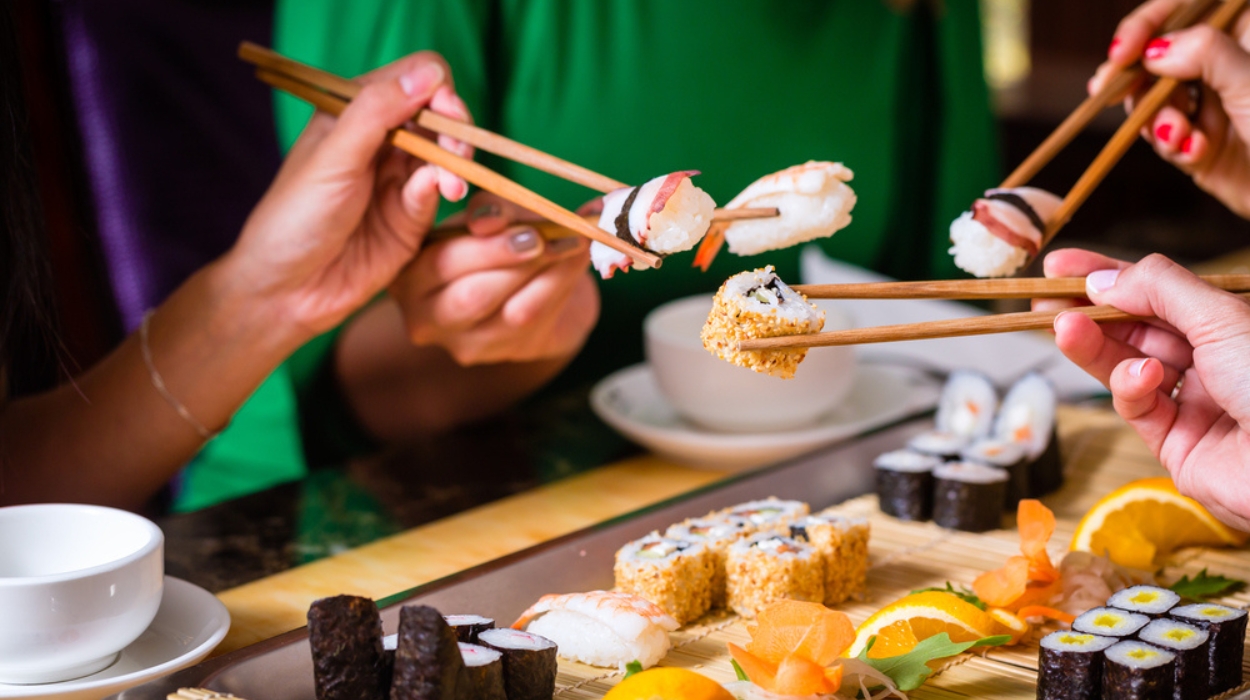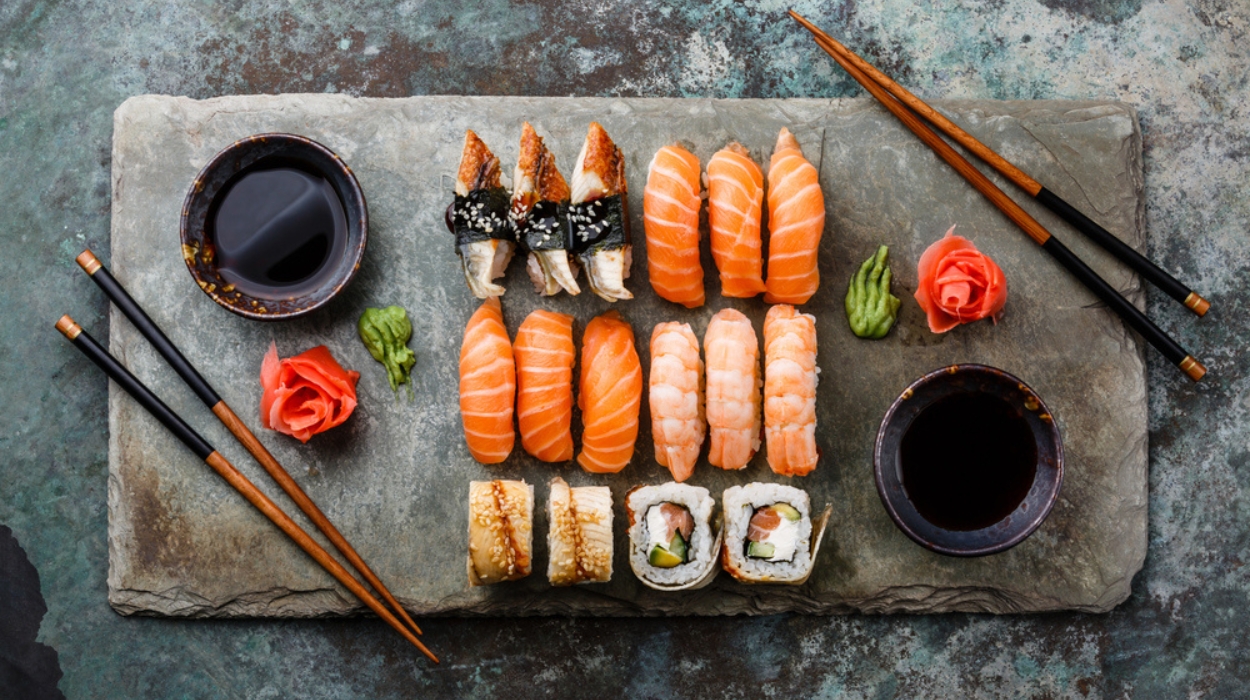Sushi is a healthy rice dish. It is native to Japanese cuisine, yet people from all around the world enjoy it. Sushi originated almost two centuries ago and has been reinvented numerous times. Today, there are numerous recipes for the dish, each with its own mix of ingredients and flavors.
But does sushi fit into a healthy diet? Is sushi good for weight loss? In this review, we examine whether or not sushi can help you lose weight and, if so, how you should consume it without packing on the pounds.
Is Sushi Good For Losing Weight?
Yes. However, it depends on the type of sushi. Different ingredients are used to make different types of sushi, and various toppings are added. People who want to lose weight should choose sushi made with low-calorie ingredients with high nutritional value. If necessary, the additives and accompaniments selected should be weight-loss-friendly as well.
Is Sushi Good For Weight Loss?

Is sushi good or bad for weight loss? It depends on the ingredients used.
Sushi is mostly made of low-calorie components, making it a feasible option for anyone trying to lose weight. However, the adaptable entree can also be prepared with other high-calorie ingredients, compromising its healthfulness.
Low-Calorie Sushi
Modern sushi is mostly composed of rice, veggies, and thinly sliced raw fish, all of which are low in calories. Eating a sushi roll made with these ingredients can assist you in achieving a calorie deficit to lose weight.
Some individuals are wary of its suitability for weight loss because sushi is a rice-based food. Despite the refined carbohydrates, sushi rice is a weight loss promoter due to its low fat and calorie[1] content. Even better, its carbs are a wonderful source of quick bursts of energy for muscles and the brain,[2] essential when following a weight loss strategy.
Sushi Is A Nutrient Dense Food
Since sushi combines many types of food, it offers a wide range of nutrients, especially if cooked with naturally sourced components. The dish is also served with various seafood featuring seaweed and different fish species. Salmon[3] is common for most sushi recipes, and it can be used raw or cooked. Either way, raw fish is a potent protein source that keeps you satiated for extended periods.
Sushi Makes A Great Match With Nutritious Foods
Most establishments serve sushi with miso soup. Miso paste[4] is created from fermented soybeans and adds a lot of nourishment to meals, such as vitamin K, zinc, calcium, and manganese. The soup also contains probiotics,[5] which aid in metabolizing subcutaneous fat in the body.
A sushi roll can be served with various accompaniments, including vegetable salads, soy sauce, and seaweed. Cucumber, soy sauce, and avocado as side dishes boost the meal’s nutritional profile and hence weight loss efforts. Nori, a nutritious seaweed widely used in sushi dishes, is high in antioxidants.
So, is eating sushi good for weight loss? Sushi alongside other healthy options is ideal for weight loss, especially for those who are doing strength training or cardio to lose weight.
Some components or additives are unsuitable for weight loss due to high-calorie content. Sushi, fortunately, is versatile and may be prepared with low-calorie ingredients and lean protein from other fresh fish than salmon, a fatty fish choice.
The Nutritional Value Of Sushi

Sushi’s healthy nutritional composition is determined by the recipe used to prepare each kind. The dish is a combination of macronutrients and micronutrients because each item contains distinct nutrients.
Nutritional Profile Of Fish In Sushi
Wild-caught salmon is the preferred choice for raw or cooked fish since it is high in protein, minerals, vitamins, and fats. According to the U.S. Department of Agriculture, each 100 grams[6] of salmon contains
- 142 calories.
- 19.8 grams of protein.
- 6.34 grams fat.
- 0.8 milligrams iron.
- 12 milligrams calcium.
- 44 milligrams sodium.
- 2.1 grams of monounsaturated fatty acids.
- 55 mg of cholesterol.
Wild-caught salmon is useful for weight loss because it is high in omega-3 fatty acids,[7] specifically docosahexaenoic acid and eicosapentaenoic acid. The marine omega-3s are unique in that the body requires them for good cell development but cannot create them.
More importantly, omega-3 fatty acids aid cardiovascular health[8] by decreasing blood pressure and heart rate and enhancing blood vessel function. Supporting these processes helps with weight management as a whole, especially for people running or walking several miles per day to lose weight.
Marine omega-3 fatty acids also aid in reducing the risk of cardiovascular disease[8] and several malignancies in individuals not on statin medication. They also improve brain function, leading to better moods and benefiting people trying to lose weight.
Nutritional Profile Of Sushi Rice
White sushi rice is the primary ingredient in traditional sushi. White rice includes the following nutrients per 100 grams[9] of cooked grains:
- 143 calories.
- 0.34 grams iron content.
- 31.4 grams of carbohydrates.
- 2.86 gram protein.
- 0 grams of fat content.
Nutritional Profile Of Wasabi In Sushi
Wasabi is a cruciferous vegetable that is frequently used in sushi and sashimi. It is used in Japanese recipes mostly for its flavoring characteristics. It is a fantastic vegetable to choose if you want to lose weight. Approximately 1 teaspoon of wasabi powder is used in the sauce recipe for sushi.
An animal study revealed that wasabi consumption improves cardiovascular health[10] by lowering blood pressure, particularly in situations of nutrition-induced blood pressure.
Eating wasabi has also been linked to better gut health[11] because it alters the microbes in the digestive tract. Wasabi, rice, and wild-caught salmon, when combined, can expedite weight loss while also supporting it in other ways.
What Sushi Is Good For Weight Loss?
The best weight-loss sushi contains nutritious ingredients with few to no additives. Sushi that is good for those trying to lose weight should, ideally, have the fewest calories per serving.
Plant-Based Roll
Sushi is often made with fish such as mackerel and salmon, but there are also vegan options[12] that are suitable for weight loss. The vegetarian sushi roll includes seaweed, particularly nori.[13] Nori is healthy since it is low in calories yet high in nutrients. It provides protein, minerals, and a variety of vitamins that help with weight management.
You can also order sushi made with more common veggies like cucumber, carrots, asparagus, and radish. These veggies can be used in sushi, either fresh or pickled.
Avocado, while not a vegetable, is a feasible choice for vegan sushi. Some vegans prefer to combine it with other vegetables to enhance the flavor. You can use tofu or combine it with edamame beans to improve the protein level.
Salmon Avocado Roll
One of the most weight-loss-friendly sushi combinations is salmon and avocado. Aside from omega-3 and the other health benefits listed, frequent salmon consumption helps lower bad cholesterol[14] in the body. It aids in reducing calorie conversion to fat while raising levels of beneficial cholesterol.
Avocado, on the other hand, is a medium-calorie fruit[15] high in weight-loss supporting nutrients. Avocados are high in dietary fiber, which helps to suppress appetite and reduce cravings for unhealthy foods.
Eating avocado also improves intestinal health and reduces the risk of developing diet-related diseases such as diabetes mellitus. It also aids in reducing bad cholesterol and increasing thermogenesis (thanks to the monounsaturated fats), hence complementing the weight loss plan.
Sushi consisting of salmon and avocado may, therefore, facilitate weight loss. Eating it in moderation is essential for losing weight and increasing your fiber to lose weight.
Rainbow Roll
Rainbow roll is the term given to sushi made up of numerous components that can be blended in various ways depending on the recipe. A rainbow roll typically includes various types of fish, avocado, cucumber, crab, seaweed, and a layer of vinegared rice. This sushi is packed with nutritious ingredients that are primarily low-calorie and low-carb, making it a great option for dieters. Serve with miso soup for a more tasty but healthful meal.
How To Avoid Gaining Weight While Eating Sushi?
Sushi can be harmful to health if consumed carelessly. One traditional sushi roll, California style, has only[16] 28 calories for a one-ounce roll. That makes a plate of six 168 calories, certainly a low-calorie meal. Some of the most important techniques to avoid this possibility are as follows:
Exercising Portion Control
Sushi, like any other cuisine, can cause weight gain if consumed in excess. A good rule of thumb for people wanting to lose weight is to limit their sushi consumption to 2 to 3 servings per week.[17] Each plate shouldn’t have more than ten sushi rolls. Even when using a keto supplement to help with weight loss, limiting intake can help generate a favorable calorie deficit.
Eating Sushi With Less Rice
Also, pick sushi with less rice if possible. Rice, especially white rice, is high in refined carbs and low in nutrients. In other words, its glycemic index[18] is pretty high, which is not good for losing weight.
The favor-cone-shaped sushi rolls reduce the quantity of white rice contained within each portion. Sushi cooked with brown rice is a healthier option because it contains more dietary fiber[19] and has less impact on blood sugar levels after eating. However, brown rice isn’t as good for sushi because the grains don’t stick together as well as white rice grains do.
In this way, brown rice makes it hard to make sushi.
Pairing With Salad
Another healthy approach is to pair sushi with healthy foods. Choose miso soup, cucumber salad, akadashi, or any other weight loss-friendly condiment, whether eating out or preparing it yourself. However, be sure your accompaniment of choice is nutrient-dense and full of nutritious food.
Avoid Unhealthy Additives
It is also critical to avoid unhealthy additives and accompaniments. You may help your weight loss efforts tremendously by avoiding sushi rolls that are loaded with cheese and other sources of excess calories. Also, stay away from tempura sushi rolls, which are made with tempura batter and are fried in oil.
Vegetables that only require shallow frying, for example, can be preferred over fish that require deep frying.
Avoiding Contamination
Sushi is frequently avoided due to the potential health concerns connected with consuming raw seafood. This is understandable because raw fish can cause parasites and bacterial[20] diseases. People aiming to lose weight should consider eating sushi made with cooked fish.
Those who want their fish uncooked might freeze it for several days, preferably a week.
Conclusion
Is sushi bad for weight loss? Many individuals question if they can eat sushi while trying to lose weight. Fortunately, sushi is often helpful for weight loss because its contents are low in calories.
Nonetheless, many recipes are available for creating distinct types of sushi, each with varying degrees of suitability for weight loss. The greatest sushi to eat when trying to lose weight is minimal in overall calories.
Frequently Asked Questions
Different kinds of sushi can help you lose weight. The rainbow roll, the plant-based roll, and the salmon avocado roll are some of the best.
Depending on the ingredients, 500 calories equals 9-12 sushi pieces.
Sushi is extremely healthful because it is typically produced with low-calorie components. However, it can be unhealthy if it contains high-calorie components or involves improper cooking methods, such as deep frying.
A person’s nutritional needs can be met in about six pieces for women and nine pieces for men per serving. You can eat them twice or thrice a week as long as you don’t go above the suggested daily limit.
In general, sushi helps people lose weight. Checking the contents, though, is crucial if you want to reach the calorie deficit required for weight loss.
It is determined by the components utilized. Fish, rice, and veggies are common ingredients. The nutritional profiles combined increase the overall value of each piece of sushi.
 Evidence Based
Evidence Based
